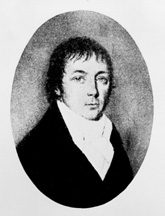William Smith (politician, 1762)
William Smith (* 1762 ; † June 26, 1840 near Huntsville , Alabama ) was an American politician who represented the state of South Carolina in the US Senate .
Neither the exact birthday nor the place of birth of William Smith are known; it is believed that he was born in what will later be the state of North Carolina . He first attended several private schools, then studied law and was admitted to the bar in 1784. First he settled as a lawyer in Pinckneyville (South Carolina), then later in Yorkville . He also worked as a planter .
His political career began with membership in the South Carolina Senate , to which he belonged from 1802 to 1808; from 1806 Smith was president of this chamber. He then served as a judge at the Circuit Court of South Carolina until 1816 , before he was elected to the US Senate for the Democratic Republican Party . In Washington, DC on December 4, 1816, he succeeded the resigned John Taylor . He also won the election for the following full legislative period and subsequently headed the Senate Judiciary Committee , but failed in the next attempt at re-election in 1822 and consequently had to leave the Senate on March 3, 1823. During this time, the Missouri Compromise was the focus of political events; Smith took the Southern line of thinking that slavery was a positive institution.
Smith was then a member of the House of Representatives from South Carolina from 1824 to 1825 . When he was re-elected US Senator after the death of John Gaillard and returned to Congress on November 29, 1826 , he became an opponent of the US Vice President John C. Calhoun , who was also from South Carolina, and an opponent of his nullification doctrine . In the presidential election of 1828 Calhoun was the official Democratic candidate for the office of Vice President alongside the victorious Andrew Jackson ; however, seven members of the Electoral College from Georgia refused to vote, which they instead cast for William Smith.
In 1830 Smith ran unsuccessfully for re-election to the Senate, which he had to leave on March 3, 1831. Immediately thereafter he was again State Senator in South Carolina and remained so until 1832. In that year he first moved to Louisiana before he settled permanently on a farm near Huntsville (Alabama) in 1833. There, too, he remained politically active and sat in the Alabama House of Representatives from 1836 to 1840 . In the presidential election of 1836 he was re-run as a candidate for the vice presidency in some states instead of the official Democratic candidate Richard M. Johnson . Ultimately, he received 23 electoral votes, all from Virginia , whose electors refused to vote for Johnson. This narrowly missed an absolute majority and had to face a runoff election in the US Senate, which he clearly won against Francis Granger of the Whig Party .
On March 3, 1837, Smith was nominated by President Jackson to serve as a Justice to the United States Supreme Court . The US Senate confirmed him with 23:18 votes, but he resigned from office. Smith died in June 1840 on his estate "Calhoun Place" near Huntsville and was buried in the family cemetery there.
Web links
- William Smith in the Biographical Directory of the United States Congress (English)
- William Smith in the database of Find a Grave (English)
| personal data | |
|---|---|
| SURNAME | Smith, William |
| BRIEF DESCRIPTION | American politician |
| DATE OF BIRTH | 1762 |
| DATE OF DEATH | June 26, 1840 |
| Place of death | near Huntsville , Alabama |

